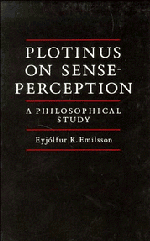Book contents
- Frontmatter
- Contents
- Acknowledgements
- Introduction
- I Plotinus' metaphysics
- II Plotinus' views on the soul and man
- III The relation between the eye and the object of vision
- IV Sensory affection
- V The unity of the senses
- VI The objects of perception
- VII Perceptions as acts and forms in perception
- VIII Conclusions
- Abbreviations
- Notes
- Bibliography
- Index
VII - Perceptions as acts and forms in perception
Published online by Cambridge University Press: 07 May 2010
- Frontmatter
- Contents
- Acknowledgements
- Introduction
- I Plotinus' metaphysics
- II Plotinus' views on the soul and man
- III The relation between the eye and the object of vision
- IV Sensory affection
- V The unity of the senses
- VI The objects of perception
- VII Perceptions as acts and forms in perception
- VIII Conclusions
- Abbreviations
- Notes
- Bibliography
- Index
Summary
Perceptions as acts
The notion of act (energeia) is an Aristotelian borrowing, which Plotinus, like Aristotle, uses in various contexts. As a first approach to Plotinus’ notion of energeia in connection with perception, it will be instructive to compare his views with those of Aristotle. But first, a remark about terminology: The term energeia in Aristotle has been translated variously as “act”, “activity”, “actuality”, “actualization”, and “realization”. As will become clear, I think that so far as Plotinus is concerned, his notion of energeia is best captured by “act” or “activity”, though “actualization” may sometimes be appropriate. But since we are concerned with finding what it means for him to say that something is energeia, and since a choice between the different English words listed above may prejudge the question at issue, I will use the Greek term to begin with.
Several commentators have remarked that Plotinus’ description of perceptions as energeiai shows that he thinks of perception as something active, where “active” is contrasted with “passive” in the sense according to which things are said to be passive when they are “mere recipients” or do not contribute anything of their own. Now, I think that this interpretation of Plotinus is quite right and that the point is an important one. However, it seems to me that it is far from self-evident that this is what the term energeia suggests, especially if we consider its Aristotelian origin. According to Aristotle and, as we shall see, Plotinus as well, the notion of energeia is correlated with that of dynamis (potency).
- Type
- Chapter
- Information
- Plotinus on Sense-PerceptionA Philosophical Study, pp. 126 - 140Publisher: Cambridge University PressPrint publication year: 1988



